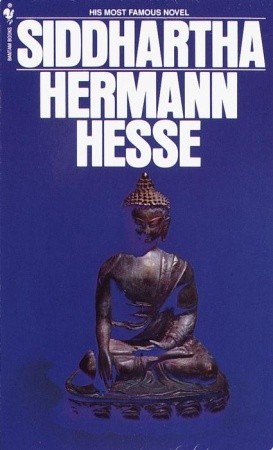“Siddhartha” by Hermann Hesse

1986. I’m in a class called “The Problem of God” at a Jesuit university taught by an atheist who’d been raised Catholic. One of the required books is Siddhartha by Hermann Hesse, and the paper we were required to write on it was in response to the question: “Is it possible to be in the world and not of it?”
I am abashed, because it’s a cliche, to say that this book and some of the others like it jolted me out of the mostly complacent beliefs I’d been raised with in the Episcopal church. I didn’t run out and say I was a Buddhist or get a bumper sticker, but I started saying that I was raised Christian rather than that I was a Christian. Interestingly (or not) nearly 3 decades later, I’m not much more defined in my beliefs. I still wander and wonder, unsettled.
Siddhartha is a fairy tale, based on the life of Gotama Buddha, written by Hesse, a German Protestant. Most Buddhists agree this isn’t a good book about Buddha or Buddhism, but interesting perhaps as a German Protestant’s understanding of Buddhism. Like Khalil Gibran’s The Prophet, it’s become a beloved book that perhaps belongs better in pop culture or self help than in religious studies.
Siddhartha and his friend Govinda go out from his wealthy home and become ascetics, then part ways when Govinda decides to follow Gotama Buddha and Siddhartha says he much go his own way, a response in harmony with the Buddha’s teaching that there is no one truth, no one teacher and each person’s answers lie within. Siddhartha wanders, then becomes enmeshed in life when he takes up with a courtesan (an interesting woman, yet the book is obsessed with her lips that look like a ripe fig, and isn’t she really just a variation on the Hooker with a Heart of Gold? and on the sexy older woman who teaches the young man The Ways of Love.) Siddhartha becomes nauseated and suicidal, but listens to the river and reaches a form of enlightenment not unlike the Buddha’s.
This is a lovely little story, stereotypes of women aside. It’s accessible. But I think too often it’s taken as Buddhism, rather than a little sliver of a story about Buddhism written by a white man who wasn’t a Buddhist. And the inaction that is ultimately validated seems antithetic to a world of increased justice and peace.
Some other reviews I found interesting included Keely’s on Goodreads, and one at The Open Critic.